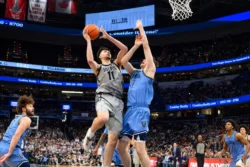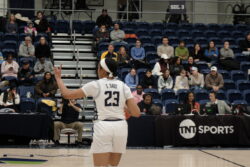It’s been a rough year for me as a Bay Area sports fan. Neither the Athletics nor the Giants made the playoffs this year. With Barry Bonds’ credibility called into question by the Balco investigation, as well as the A’s recent trading of two of the best pitchers in the league for half a dozen guys that may or may not pan out, things aren’t looking too good. More recently, the Raiders and the Forty-Niners shared the pain this past NFL season. The Warriors, of course, continue their 20 year losing streak, marked by ineptitude on the court as well as in the front office.
My one and only solace was an encore performance by the young San Jose Sharks team which shocked the league when they made it into the playoffs last season. I needed the National Hockey League.
Then I watched as my hopes and dreams of a year in sports not completely gone to waste were shattered. Shattered by players who just don’t think seven digits are enough. Shattered by owners who just don’t think their 2004 BMW is going to cut it anymore.
Granted, there is a slight chance that the season can still be salvaged. Most observers speculate that a shortened regular season could be possible, provided that it start no later than January. However, the clock is quickly ticking away. And while a new meeting between players and owners has been scheduled for the 19th, expectations are low.
The lockout arises from the controversy around the subject of salary caps. It was only a matter of time before caps became an issue: over the past 12 years the average salary has risen from roughly $600,000 to $1.83 million.
The league’s latest American television contract guarantees no money upfront for broadcasting rights and almost every team has reported declines in ticket sales. The Players Association, for obvious reasons, stands opposed to the cap. With owners like Peter Karmanos, Jr., however, you really have to ask if the players’ salaries are the cause of the economic decline of the league. Karmanos complains about the financial woes of his team, but never pauses to consider that moving the team to North Carolina, where there are more Klan members than hockey fans, might be part of the problem.
Nor does he consider that his own management might be the reason for his team’s abysmal record: both last year’s champion and the runner up, Calgary, respectively, had lower payrolls than Carolina. The players haven’t been writing those enormous checks themselves.
The NHL has already faced steadily waning popularity, even when in season. Even if they succeed in instituting a cap, the NHL could be reaping the financial consequences of this lockout for years to come in the form of disillusioned fans. As large as player salaries may be, a canceled season isn’t good for business either, and it isn’t good for fans like me.





